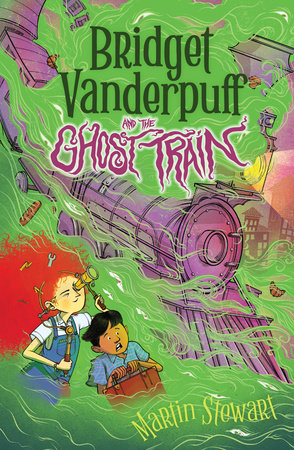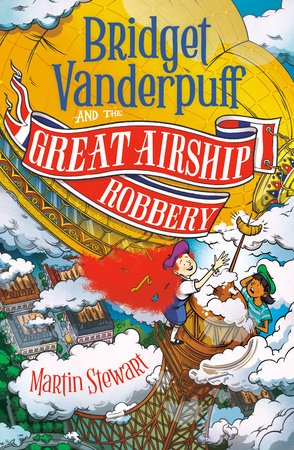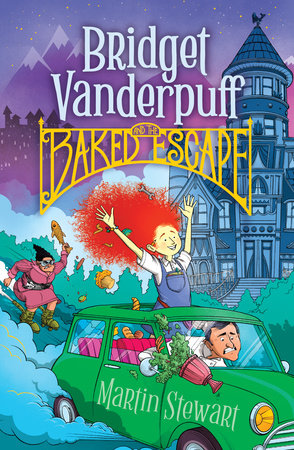Excerpt
Bridget Vanderpuff and the Ghost Train #2
1
Footsteps
memories * lockpicks * surprisesBridget Vanderpuff slid another lockpick from her teeth.
“Can’t you go any faster?” asked Tom.
Bridget thinned her lips.
“Tom Timpson,” she whispered, reaching for her Listening Glass. “I am going as fast as I can.”
“But I—”
“
Ssh!”
Bridget pressed on the earpieces.
Nothing—just the breeze from the open window, the bubble of voices in the street, and the distant hiss of evening’s tide.
“No footsteps. We’ve still got time.”
“
Time?” hissed Tom. “There’s no
time! I’m going to get caught, again, and I’ll ruin
everything.”
Bridget shook her head.
“Why you thought hiding in a
glass cabinet would—”
“I
said sorry. This is hopeless, isn’t it? There’s no way you’ll be able to—”
“Do you remember the Orphanage?” Bridget said quickly, producing a new lockpick from her explosion of orange hair.
Tom blinked.
“Of course I do.”
“Good,” said Bridget. She angled the pick—a hooploop—into the little brass lock. “And do you remember the bear trap in Miss Acrid’s office?”
They shared a grin.
“Of
course I do,” he said again. “I lost count of the number of times she put me in that thing.”
“One hundred and seventy-six,” said Bridget, who never lost count of anything. She gave the lockpick another
twist, then took a different one—a tweezle-tip—from her hair.
“I never did anything to deserve that bear trap,” said Tom.
Bridget raised an eyebrow.
“Oh, all
right,” said Tom, holding his hands up. “Maybe
sometimes I—”
“Put cod liver oil in Miss Acrid’s apple juice?”
“That was
your idea, I just—”
“Tied the enormous laces of her enormous boots to the ceiling fan, then turned it up to ‘Good Heavens That’s Fast’?”
“Well, yes, but it
was you who put the—”
“Paint in her toothpaste?” interrupted Bridget.
They laughed quietly. Tom’s breath fogged inside the cabinet.
“What did she shout at us?” he said.
Bridget leaned back, pulled her hair over her ears, and screamed: “All
right, you horrrrrid little
urchins!
Whaaaaii are my lovely
tooths all
bogging and bloooo?”
Tom shuddered—the impersonation of Miss Acrid’s seagull shriek was chillingly good.
“I’m glad she’s gone,” he said.
“Not just gone.” Bridget nodded. “Locked up in Barefoot Prison.”
She checked the Listening Glass again.
There
was something: a distant rumble, as of thunder heard from under a blanket . . . then all was silent, leaving only the grandfather clock
tick tocking outside Bridget’s Room of Bed.
She
concentrated.
Tom watched her fingers dancing on the lock, eyes closing as she listened to the whispers and clicks of the pins inside.
“Does it ever make you sad?” he asked, gazing up at the teeming shelves.
Bridget breathed in, her blood bubbling with Vanderpuff’s sensory
whoosh: smells she could taste—fragrances she could almost
hear, such was their
zinging, smacking, popping power.
Butter.
Strawberries.
Vanilla.
Chocolate.
Her heart quickened.
Each scent played like a musical note in her mind, a mouthwatering wave of orchestral yumminess that filled her with so much joy she thought she might burst with happiness.
“What could possibly make me sad?” she said.
“You know . . .” said Tom, picking at his sleeve. “The Orphanage. Being an Errant Child. The dungeon. The Great Maze.
All of it.”
“
Pfft,” said Bridget, blowing up a tendril of fringe.
“What did you say?”
“I said
pfft! So what if Miss Acrid dropped me in the Bottomless Pit! It never—”
“Why would an orphanage need a
Bottomless Pit?” asked the mayor, who was hiding behind the curtains.
“It wasn’t
really bottomless, ma’am,” said Bridget. “It only went down for three or four miles.”
The curtains wobbled.
“She also locked you in a suitcase and threw you in the lake,” said Tom.
“Not just a suitcase,” replied Bridget.
“A trunk.”
“A backpack.”
“Holdall.”
“Satchel.”
“Clutch.”
“The clutch
was a bit of a squeeze,” admitted Bridget. “But I always got out. Didn’t I?”
Tom gave her a soft smile.
“Always.”
Bridget took a scooptop pick from her hair.
“And I always got you out of that bear trap, didn’t I?”
Tom put his hand on the glass.
“Every time,” he said.
Bridget pressed her hand against his.
“So I always had you beside me, singing something silly.”
“
Silly?” said Tom. “I thought you liked ‘Good Luck, Mr. Chipmunk!’”
“That glass thing is moving,” said Mr. Constantine, the stationer, from behind a pot plant.
Bridget spun around.
The Listening Glass was hopping on the floor.
She snatched up the earpieces.
Footsteps.
Loud and clear—and getting closer.
“Oh, Bridget!” wailed Tom. “I’m sorry! Just throw a blanket over me, or—”
“
Sssshh!” hissed Bridget, swapping back to the hooploop.
Blocking out the rattle of the Listening Glass, she focused on the lock’s tickling pins, working the pick like a cellist’s bow until, with a neat, spinning
click, the pins aligned—and the lock swung open.
“You did it!” hissed Tom.
The Listening Glass toppled on its side.
“Quick!” whispered Bridget, pulling him free in a shower of crumbs. “Hide!”
The door burst open, silhouetting a man wearing sparkling chef’s whites and a towering, cream-whip hat.
Mr. Ernest Vanderpuff—the world’s finest baker—stepped into the shop.
“Hello?” he said. “Is somebody there?”
“
SURPRISE!” shouted Bridget, leaping to her feet alongside Tom, the mayor, and all the people of Belle-on-Sea.
They laughed as the great man staggered backward,hat clutched to his chest.
“Good heavens, my dear!” said Mr. Vanderpuff, hugging Bridget and lifting her from the floor. “I nearly jumped out my clogs! Whatever is going on?”
“Oh, Bridget, you did it!” said Pascal. He climbed onto Bridget’s shoulder. “If Tom had been seen, the surprise party would have been
ruined!”
“A surprise party?” Mr. Vanderpuff beamed as people began clapping him on the back. “For me?”
Bridget wrapped her arms round his waist, and gave him a humungous hug.
“Happy birthday, Dad!” she said.






